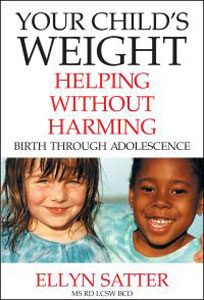

Family Meals Focus
The Ellyn Satter Institute Newsletter
Big baby, big parents: No problem!
by Ellyn Satter, MS, MSSW, Dietitian and Family Therapist
If you have a large child and especially if you are large yourself, you are a magnet for comments and criticism. Try to ignore it. It does not follow that your child will be too fat. From birth, do a good job with feeding by following the Satter Division of Responsibility in Feeding. Follow a division of responsibility with activity, as well. Then trust your child to eat, move, and grow in the way that is right for her.
Conventional wisdom about child overweight isn’t wise
”I honestly tried not to let Martha eat so much,” explains the distraught young mother after giving up on following her physician’s advice to restrict her “at risk” chubby infant. ”But it was spoiling things with us. I hated letting her cry instead of feeding her when she got hungry. It hurt her feelings when I stopped feeding before she got full. If she grows up to be fat like me, it will have to be. But I won’t treat her that way.”
Martha’s physician assumes that Martha is at risk of overweight because she is a relatively large child of a relatively large mother. His intervention is not supported by research. Rather, Martha is at risk because the intervention undermines her mother’s trust in her ability to eat and grow well. Losing that trust is devastating. Data clearly shows that when parents perceive a child as overweight, they are concerned about it, restrict food intake, and children tend to get fatter.1,2 Clinical experience shows infant food restriction is disastrous, promoting feeding struggles that can last for years and make children fatter, not thinner. Instead of being told to restrict, Martha’s mother needed encouragement to understand and trust Martha’s feeding cues and sleep cycles and feed Martha as much as she wanted to eat.3
Assumptions are wrong
At risk parents do not eat more and overfeed their children. There is no evidence. But heavier people do diet more, and parents who go on and off diets raise fatter children.
Being big or eating enthusiastically as an infant does not predict overweight in later life.4 But labeling a child overweight sticks, as does implying overweight with such observations that the child is heavy, dense, chubby, or eats a lot. Particularly for parents who are sensitive about overweight in themselves or their child, saying or even implying that a child is overweight frightens parents into restricting. It gets worse. Children catch on that their parents consider them to be overweight and the children see themselves the same way. Perceiving themselves as overweight makes children feel flawed in every way, not smart, not physically capable, and not worthy.5
Parents who are large or even fat themselves do not eat more and overfeed their children. There is no evidence. But people who consider themselves too fat do diet more, and there is evidence that parents who go on and off diets raise fatter children.6 Rather than trying to lose weight, parents will do best for themselves and their child by avoiding weight-reduction dieting and, instead, learn to eat competently.7
Raise an emotionally healthy child
You are entitled to toughen yourself up and find ways to reassure yourself about your child’s size and shape. If she is destined to grow up large, your task is raising her to be emotionally healthy, the same as raising any other child who is different.8 Expect your health professionals, rather than harping on weight loss, to support you in parenting well with feeding and activity, then trusting your child to eat, move, and grow in the way that is right for her.
References
1. 1. Robinson E, Sutin AR. Parental perception of weight status and weight gain across childhood. Pediatrics. May 2016;137doi:10.1542/peds.2015-3957.
2. Faith MS, Scanlon KS, Birch LL, Francis LA, Sherry B. Parent-Child Feeding Strategies and Their Relationships to Child Eating and Weight Status. Obes Res. 2004;12:1711-1722.
3. Satter EM; Chapter 4, Understanding your newborn. Child of Mine; Feeding With Love and Good Sense. Palo Alto, CA: Bull Publishing; 2000:111-132.
4. Whitlock EP, Williams SB, Gold R, Smith PR, Shipman SA. Screening and interventions for childhood overweight: a summary of evidence for the US preventive services task force. Pediatrics. 2005;116:e125-e144.
5. Davison KK, Birch LL. Weight status, parent reaction, and self-concept in five-year-old girls. Pediatrics. 2001;107:46-53.
6. Hood MY, Moore LL, Sundarajan-Ramamurti A, Singer M, Cupples LA, Ellison RC. Parental eating attitudes and the development of obesity in children. The Framingham Children’s Study . International Journal of Obesity. 2000;24:1319-1325.
7. Satter EM; Chapter 2, You and your eating. Secrets of Feeding a Healthy Family. Madison, WI: Kelcy Press; 1999.
8. Satter EM; Chapter 9: Teach your child: Be all you can be. Your Child’s Weight: Helping Without Harming. Madison, WI: Kelcy Press; 2005:291-322.
Explore
For more information for parents about optimum feeding and protecting themselves against interference in a weight-obsessed world, see Your Child’s Weight: Helping Without Harming.
Related issues of Family Meals Focus
- Baby-led weaning
- Breastfeeding hullabaloo
- Feeding in your baby’s first year
- Pureed food in pouches: boon or bane
More help without harm
- Follow Satter’s Division of Responsibility in Feeding(sDOR)
- Avoid pressure
- Avoid restriction
- Children know how much they need to eat

